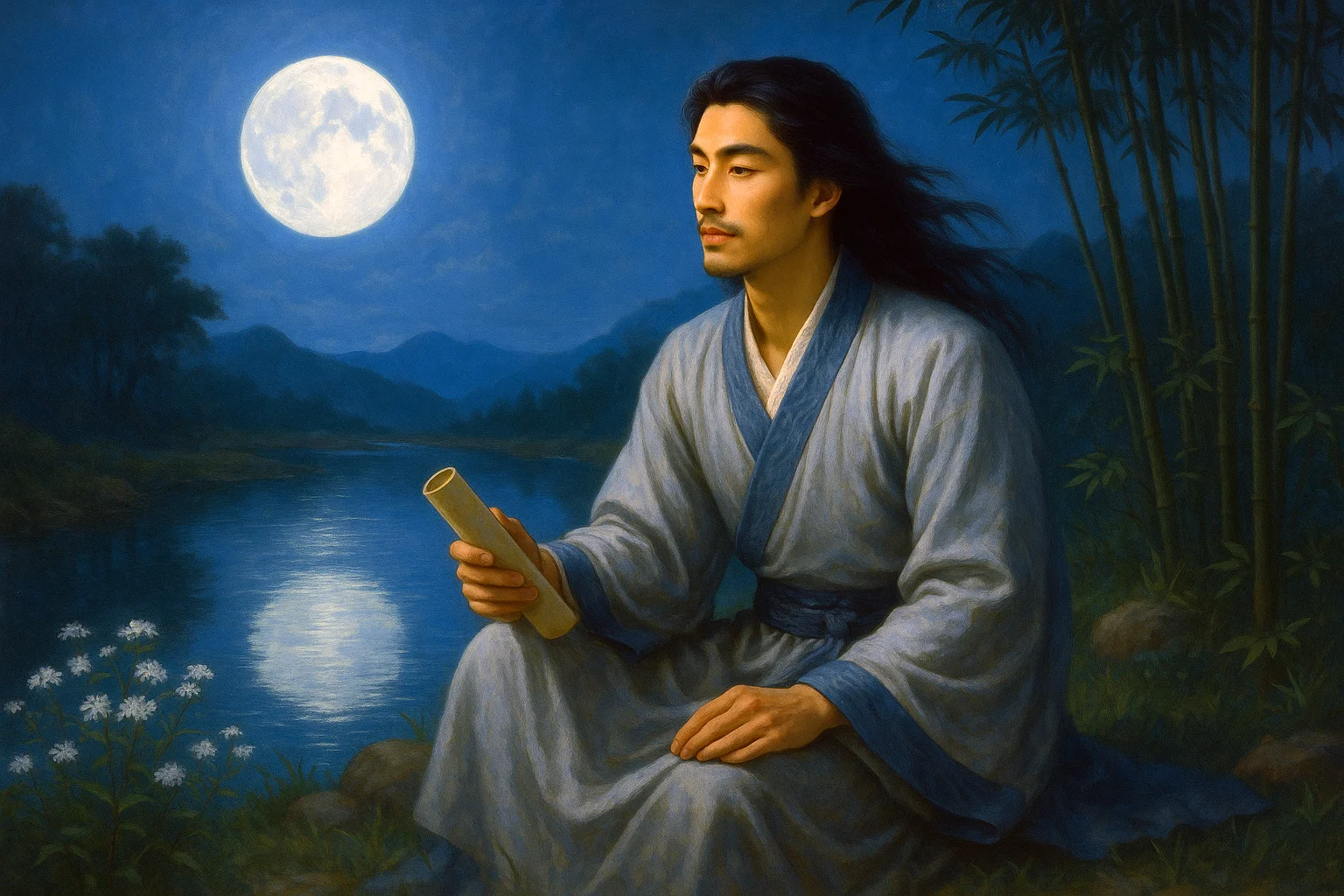This western studio's depth always convinces,
Hermit-governor paradox—what office is this?
Winecup holds windmoon, my schedule blank,
A thousand miles of plows sing autumn's thank.
Cloudwater birdsong scrubs my mind's stain,
Jade-sand tinnitus rinses the cold stream's brain.
When absorbed in yellow scrolls' tight creed,
I smell Peak Lu's incense in every reed.
Original Poem
「凝香斋」
曾巩
每觉西斋景最幽,不知官是古诸侯。
一尊风月身无事,千里耕桑岁有秋。
云水醒心鸣好鸟,玉沙清耳漱寒流。
沉心细细临黄卷,疑在香炉最上头。
Interpretation
Composed in 1072 during Zeng Gong's tenure as prefect of Qizhou (modern Jinan), this work reflects a rare moment of political stability and agricultural prosperity under his governance. The Fragrance-Collecting Studio (originally West Studio), nestled by Daming Lake, became Zeng's sanctuary for literary pursuits. The poem crystallizes a scholar-official's ideal equilibrium—where administrative success and spiritual cultivation harmonize through landscape's mediation, embodying the Song Neo-Confucian synthesis of worldly service and inner refinement.
First Couplet: "每觉西斋景最幽,不知官是古诸侯。"
Měi jué xī zhāi jǐng zuì yōu, bùzhī guān shì gǔ zhūhóu.
This western studio's quietude so pure / makes me forget my seal of office, once so sure.
The paradox of "forgetting" (不知) one's powerful position ("ancient lords" 古诸侯) through landscape immersion critiques bureaucratic identity. The studio's seclusion becomes an epistemological space where conventional hierarchies dissolve before aesthetic contemplation.
Second Couplet: "一尊风月身无事,千里耕桑岁有秋。"
Yī zūn fēngyuè shēn wúshì, qiān lǐ gēng sāng suì yǒu qiū.
With winecup facing breeze-moon, no duties press; / a thousand miles of plowed fields boast autumn's largesse.
The couplet's parallel structure juxtaposes personal leisure ("winecup facing breeze-moon") and communal prosperity ("thousand miles of plowed fields"). The implied causality—good governance enables cultural refinement—echoes Confucius' ideal where "sufficiency makes possible the arts of peace" (足而后文).
Third Couplet: "云水醒心鸣好鸟,玉沙清耳漱寒流。"
Yún shuǐ xǐng xīn míng hǎo niǎo, yù shā qīng ěr shù hán liú.
Cloud-water wakes my heart with birds' bright calls; / jade-sand cleanses my ears through chill rills' falls.
Synesthetic mastery transforms nature into sensory therapy: visual "cloud-water" (云水) merges with auditory "birds' calls" (鸟鸣), while tactile "jade-sand" (玉沙) filters through aural "chill rills" (寒流). This ecological purification ritual reflects Cheng-Zhu school's concept of "investigating things" (格物) as spiritual hygiene.
Fourth Couplet: "沉心细细临黄卷,疑在香炉最上头。"
Chén xīn xìxì lín huáng juǎn, yí zài xiānglú zuì shàng tou.
Sinking mind deep into timeworn scrolls' lore, / I seem atop Incense Burner Peak once more.
The closing metaphysical leap equates textual immersion with mountain ascension. "Incense Burner Peak" (香炉),庐山's sacred summit, symbolizes the convergence of scholarly and mystical pursuits. The "timeworn scrolls" (黄卷) become geological strata of wisdom, their study a form of landscape pilgrimage.
Holistic Appreciation
The poem unfolds around the theme of "the most secluded scenery in the Western Studio." The opening couplet provides a general overview, followed by depictions of relaxed governance and serene landscapes in the second couplet. The third couplet focuses on the sounds and sights of nature, conveying a sense of quiet contemplation, while the final couplet shifts to the realm of books and "spiritual wandering," ultimately concluding with the pursuit of knowledge and philosophical enlightenment. Through this series of images, Zeng Gong portrays an idealized literati lifestyle—one that balances diligent governance with a deep appreciation for nature and scholarly pursuits, achieving harmony between movement and stillness, official duties and leisure, the external world and inner self. The poem is meticulously structured, rich in subtle allusions, and written in lucid language, painting vivid scenes with profound emotional depth.
Artistic Merits
- Scenery as Emotional Expression, Blended Scene and Sentiment
The poet captures the tranquility and clarity of his inner world through descriptions of the lakes, mountains, springs, and birds surrounding the Ningxiang Studio. The transitions between scene and emotion are seamless, embodying the refined aesthetic of Song dynasty poetry. - Elegant and Ethereal, Dynamic Language
Phrases like "awakening the heart," "cleansing the ears," and "rinsing in cold streams" are rooted in classical allusions, with verbs that are lively and precise. These choices infuse the poem with motion amid stillness and subtle charm within seclusion, striking a balance between vitality and refinement. - Good Governance and Ideal Character
Though the poem never explicitly mentions governance, lines like "for miles, fields yield harvests year after year" suggest that effective local administration allows the poet to enjoy the pleasures of nature and scholarship. This reflects the Confucian ideal of "ordering the world before turning inward," embodying the literati's model of balancing public service with personal cultivation.
Insights
The poem reveals that the truest ideal of life lies in a balanced integration of inner and outer worlds, movement and stillness. The poet neither grows anxious over his career nor becomes vain with fame. Instead, having established effective governance, he returns to the embrace of nature, immerses himself in books, and nurtures his spirit. This composure and elegance are not unique to Zeng Gong but represent a shared aspiration among Song dynasty scholar-officials. Today, the poem still offers us timeless wisdom: the importance of "inner peace amid worldly engagement" and the value of "governing well while pursuing learning."
About the Poet

Zeng Gong (曾巩, 1019 - 1083), a native of Nanfeng in Jiangxi province, stands among the illustrious "Eight Great Masters of Tang-Song Prose." His writings distinguished themselves through an elegant classical balance, celebrated for their rigorous argumentation and refined literary craftsmanship. While his poetry embraced an artless subtlety, his prose achieved what critics hailed as "the very essence of purity" - an achievement that, though perhaps less dazzling than his contemporaries like Su Shi or Wang Anshi, earned him posthumous reverence as the founding master of the "Nanfeng Literary School."












